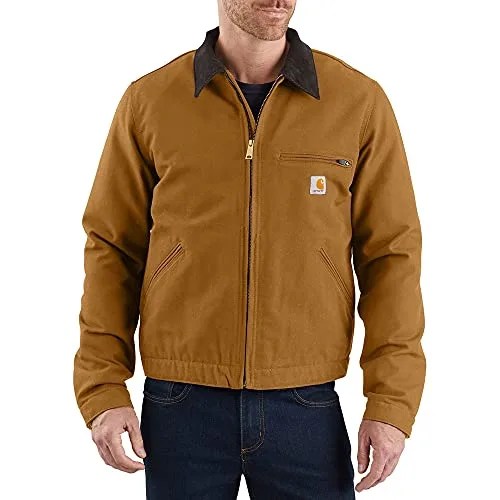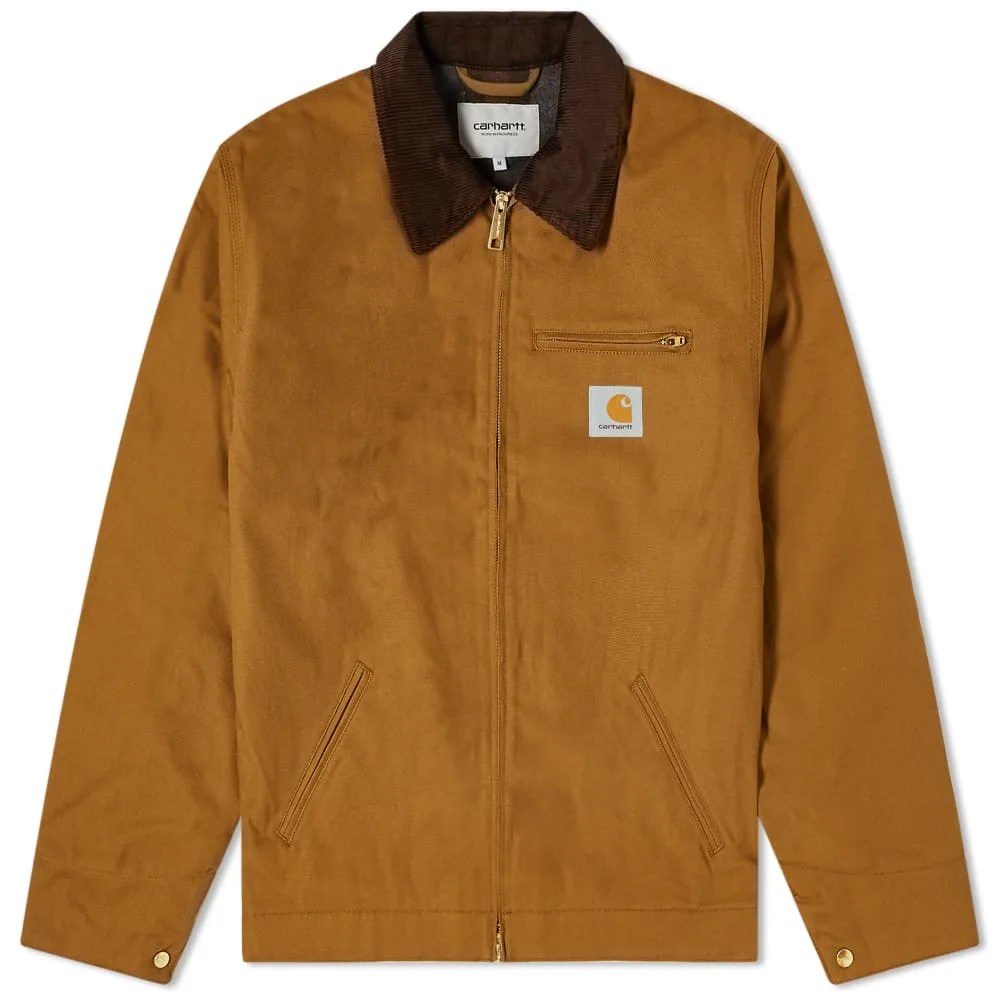You know the name. Carhartt’s classic Detroit Jacket, which was first introduced in 1954 (in denim), is a staple on construction sites, in garages, on ranches and farms, and with fashionable folks, too. See: Kanye West, Jonah Hill, Ryan Gosling, Brooklyn Beckham, Daniel Day Lewis, and Matthew McConaughey wearing one, and countless brands — Fear of God, Ralph Lauren and numerous others — copycatting the style. The workwear staple bears resemblance to many other zip-front jackets, including Dickies Eisenhower Jacket and Ricky jackets by brands both old and new. But, the Detroit Jacket has its own history — and a devoted fan base unlike any other.
“It has a simple, authentic style and fabric that appeals to a wide range of people. It’s an easy go-to jacket that can work from the job site to weekend adventures,” says Deb Ferraro, vice president of product development at Carhartt. “The fabric and color were intentionally developed to get that worn-in look with age. Today, we have softened the fabric, but didn’t take any of the durability out of it, and we wash the jacket before it leaves the factory to give it a more comfortable feel.”
Although the top layer wasn’t referred to as the Detroit until 1988, it hasn’t changed much since it was known simply as the Zipper Jacket — the transition from denim to duck cotton and the addition of a tail aside. The jacket is straight and work-oriented, albeit not as short as it used to be. It was once quasi-cropped to accommodate a tool belt. As such, one chest pocket, two slant pockets on the outside and two interior pockets on the inside (one of which is big enough to store an iPad) are the only places for your EDC (or tools).
But, before I spill the rest of the details, let’s dive into the review.
What’s Good About the Carhartt Detroit Jacket
The lifespan
Carhartt products come with inherent infinite expectations. They’re workwear products. They’re supposed to last. The 12-ounce, 100-percent ringspun, pre-washed cotton duck should stand up to typical wear and tear. In fact, as Ferraro mentioned, the fabrics and colors were chosen with age in mind. Plus, triple-stitched main seams reinforce the jacket at common stress points.
The warmth
The 2.0 version of the Carhartt Detroit Jacket comes blanket-lined in the body and quilted nylon-lined through the sleeves. Nylon lets the wearer slip into them with greater ease, as blanket snagged long-sleeve layers. Some customers — probably diehards who have lived through both generations of this jacket — have cited a difference between the new blanket and the old, but for first-timers the lining will be plenty warm. Warm enough for Michigan winters, for sure.
The freedom
The back panel on the Carhartt Detroit Jacket comes pleated for free range of mobility. The body also proves a bit roomier to accommodate a few layers and to aid in up-down work environments. Both sleeves have plenty of room at the elbows, too, so bending them doesn’t prove restrictive.
What’s Not Ideal About the Carhartt Detroit Jacket
The bulk
Although the roominess lends itself to better range of motion, there seems to be a bit too much fabric. In the body and shoulders, the jacket seems to lack structure. Sure, if you’re really braving the bitter cold and other natural elements, this excess might be an advantage, but if you’re buying it primarily for the looks (or for less intense jobs) you would be better off buying Carhartt WIP, which offers a true-to-form, tailored fit.
The measurements
Again, the original Carhartt Detroit Jacket won’t give you the personalized fit you’re probably after. In my own personal experience, the sleeves were too long and the waist too wide. Plus, the areas underneath both armpits ballooned when I had the jacket fully zipped. A simple fix would be to add one, maybe even two, layers, but by then I’d be far too warm. You may run cold, and this solution could work. I guess you could always get yours tailored, too.
The inconsistencies
Look at the Detroit Jacket Carhartt sells on its own site. Then go see what Amazon or Walmart sells. See the difference? Carhartt killed off the contrasting corduroy collar, but it seems those models are still out there. Other reviews have cited quality control issues with zippers, disproportionate sizing, and pocket placement on the inside.
Carhartt Detroit Jacket: The Verdict
Plenty of purists were upset with the changes, albeit minor, made to the classic Detroit Jacket. Gone are the contrasting collar, waist snaps for size adjustments, and full-body blanket liner. New are the washed duck exterior — it used to be rigid duck — tonal collar, rear tail, and nylon-lined sleeves. Cumulatively, these changes aren’t drastic or all that altering. But, a few reviews point out plenty of reasons why they shouldn’t have been made. The tail, which Carhartt says adds coverage, throws off the straight-bottom aesthetic the fashion-focused folks appreciated. Truckers and tractor drivers complain about sitting on it, too.
However, the brand says demand outweighs criticism. “We’re constantly rethinking things and making sure as times change. We’re still serving the consumer,” says Carhartt archivist Dave Moore. “We’re not gonna not listen to them just because something’s been around for so long.”


